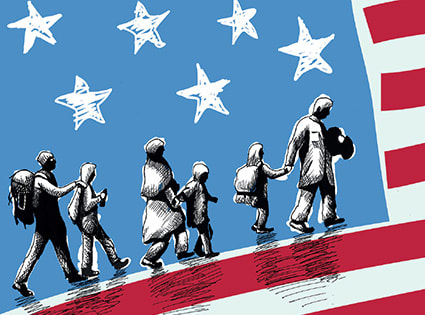Immigrants’ future hinges on midterm elections
Hundreds of thousands of foreigners believe that their future depends on a Democratic victory in Congress and the Senate, but this is not entirely true. Tens of thousands of foreign immigrants and refugees who want to apply for political asylum, residency and work permits or citizenship in the United States were nervously awaiting the results of the mid-term elections of November 8. Their fate may depend, they believe, on the victory of the Democratic Party in both houses (Congress and Senate.)Thousands of immigrants think that their fate depends on the Administration of Joe Biden and Kamala Harris, and that the Republicans cannot prevent the measures they need to be approved to regularize their legal status in the country. Measures that would come to revoke those implemented by Donald Trump while he occupied the Oval Office.
All these immigrants who aspire to live the “American dream” are somewhat right in their fears and expectations, but only partly. “It’s true that the Trump Administration ordered changes that made the process of granting the different types of visas and permits much slower,” says Raul Pinto, senior staff attorney at the American Immigration Council. “It was like putting up a legal wall,” Pinto adds. The American Immigration Council is an organization that works to “strengthen America by shaping the way the United States thinks and acts with respect to immigrants and immigration and working toward a more equitable immigration system that opens its doors to those who need protection and unleashes the energy and skills immigrants bring...” Before Trump, if the immigrant petitioner had their application or visa rejected, the Administration encouraged them to provide new information and resubmit it again with more and better information, for a new permit evaluation. “With Trump, on the other hand, the immigrant was not only not informed of the possibility of improving the application and resubmitting it, but their data was immediately transferred to the authorities in charge of their deportation,” Raúl Pinto points out. Now, in addition, there is the enormous backlog of work in these official immigration applications and the consequent delays they cause. Data provided by attorney Raúl Pinto to Sol de Medianoche shows the following: The request for a VISA for a foreign relative of an immigrant took an average of six and a half months to be resolved in 2017. In 2022 it takes 10.3 months. An application to Register Permanent Residence or Adjustment of Status took 5.5 months to resolve in 2017. Today (year 2022) it takes 22.6 months. A refugee or asylee family member’s petition for eligibility to enter the United States took 7.9 months to resolve (admitted or denied) in 2017. In 2022, 28.6 months. An Application for Temporary Protected Status took 3.4 months to resolve in 2017; in 2022, it takes 10.2 months. But it’s not all Trump’s fault. The Covid-19 pandemic and geopolitical events and military conflicts have contributed to the collapse of a system that is overwhelmed by circumstances. “If before the permits to enter to reside in the United States for humanitarian reasons were accounted for an average of twelve hundred filings each year, with the withdrawal of U.S. troops from Kabul (Afghanistan) last summer, the number of applications rose to 50 thousand, and with the Russian invasion of Ukraine the number has again increased exponentially.” “There has been a significant increase in the number of applications for visas and permits, without the Federal Government (neither this one under Biden, nor the previous one under Trump, nor the previous one under Obama) having decided to increase the material and human resources that the United States Citizenship and Immigration Services (USCIS) needs to process them with the necessary speed.” “USCIS needs to be given more funding to provide more human and material resources,” says Raul Pinto, and this is why “the Backlog and Transparency Act initiative, introduced by Congressman Tony Cardenas on October 25,” which seeks to “address the long delays faced by millions of immigrants who applied for an immigration benefit but have not received a decision,” is so important (much more than it may seem at first glance.) The bill would impose strict reporting requirements on USCIS, ensuring that the agency reports to Congress on the number of pending cases and the average processing time for each type of immigration benefit adjudicated by the agency. “Cardenas’ proposal would also require USCIS and the Government Accountability Office (GAO) to analyze the causes of the backlog and propose ideas to reduce delays,” notes attorney Raul Pinto. |
